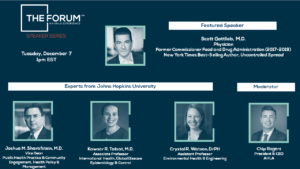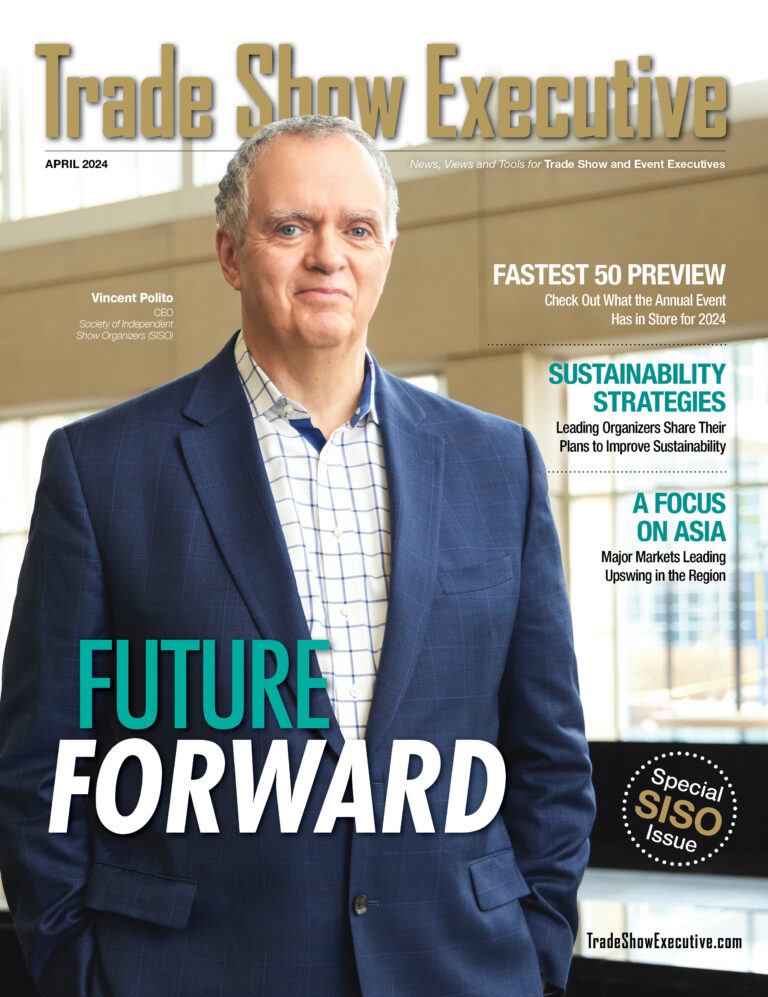
WASHINGTON, D.C. — The latest edition of the American Hotel & Lodging Association’s (AHLA) Forum Speaker Series held on December 7th featured the preeminent physician Dr. Scott Gottlieb, M.D., a former commissioner of the Food and Drug Administration and author of Uncontrolled Spread, along with a panel of experts from Johns Hopkins University: Joshua M. Sharafstein, M.D., Vice Dean, Public Health Practice & Community Engagement, Health Policy & Management; Kawsar R. Talaat, M.D., Associate Professor, International Health, Global Disease Epidemiology & Control; and Crystal R. Watson, DrPH, Assistant Professor, Environmental Health & Engineering.
As top scientists around the world work to understand the Omicron variant, there are developments from South Africa, where it was first discovered, that Gottlieb said could play out in the U.S. as well. Specifically, he said, “It appears to be more transmissible because it can affect people who have already been infected. But in the U.S., we have a higher level of immunity than in South Africa because we have more people who have been infected or who are vaccinated, or both, and a much smaller level of immune-compromised people.”
Related. Omicron Shouldn’t Lead to Panic
His fear is that, so far, omicron is causing mostly mild illness in people who are vaccinated. “We have yet to see how omicron will behave in populations that have not been vaccinated, including children and toddlers, or who were exposed to a previous coronavirus strain and are thinking that because of that they are immune.”
Modeling shows that antibodies produced by two doses of vaccine are not going to be that effective against omicron infection. “People who have been infected and vaccinated or have had three doses will have a meaningful level of protection,” he said.
Related. Trade Show Industry Reacts to Omicron Variant
Gottlieb also explained the difference between protection against infection and the wider protection against serious disease. “After a booster, the T cells become protective against a wider range of variants.”
After laying the groundwork with Gottlieb, Moderator Chip Rogers, AHLA President and CEO, asked the questions on everyone’s mind in the travel and business events industries:
When will life get back to normal and people be able to travel again?
One game changer will be the new medications under development by Pfizer and Merck that substantially reduce the risk of severed illness, disease or death when taken in the 5 five days. These could also be used as a prophylactic for our most vulnerable population, Gottlieb suggested.
What can we do to protect ourselves?
“Vaccination is the best way to protect ourselves,” Talaat said. “Encourage others to get vaccinated. Make sure everyone has access. For those who are not vaccinated, continue to wear masks and avoid crowded places where people are not wearing masks. It really restricts your life and the best way to remove those restrictions is to get vaccinated.”
Are all masks created equal?
“We know a lot more about masks now than we did at the beginning,” Watson said. “Masks that are made of tightly woven fabric or KN95s or N95s are the most protective, and cloth masks with three layers and surgical masks are also good.”
Will we go back to shutdowns?
“I don’t think we’re ever going to do the kinds of shutdowns we did at the beginning of this epidemic,” Gottlieb said. “We had a completely immune-naïve population. It was never envisioned that shutdowns would become preemptive.”
Related. Industry to Fully Rebound by 2023, Says CEIR Index Report
What about travel bans?
“I don’t think travel bans are necessary,” Gottlieb said. “You can achieve what you want to by vaccination and testing 24 hours in advance like we are doing now. It’s very effective and you only miss those people in whom the vaccination is incubating.”
How can people meet safely?
“We know a lot more now about layering mitigation measures,” Watson said. “Vaccinate, wear good masks, be in well-ventilated spaces, and test before you leave and after you get home.”
Reach Scott Gottlieb at scott.gottlieb@aei.org; Kawsar Talaat at ktalaat@jhu.edu; and Crystal Watson at cwatson@jhu.edu











